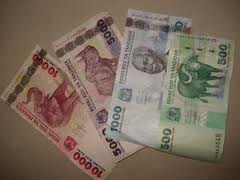The shilling has been trading at a steady range for the last eight
months signifying that the monetary policy to reverse the free fall of the
local currency about a year goes paid-off.
The shilling, according to the Bank of Tanzania (BoT), has been trading
at between 1,573/- and 1,590/- for the US dollar since January this year. BoT’s
Governor Prof Benno Ndulu said the range is much better compared to the last
September amount at 1,825/- a dollar while volatility is at the minimal level.
He said
the shilling volatility was influenced heavily on the global financial crisis
that hit the world between 2008 and 2010 which did not spare even international
currencies.
At the end of last week, National Microfinance Bank quoted the shilling
at 1,568/1,577 to the dollar, little changed from 1,565/1,577 in trading
session Thursday.
“(However), the shilling is expected to weaken slightly
against the dollar in the days ahead as traders anticipate growing demand for
the greenback from importers and retail traders,” NMB said in its e-Market
report.
Another bank, Standard Chartered, said the shilling traded flat against
the US dollar for yet another day on Thursday because there was little activity
in the market.
“Today (Friday) as it’s the last day of the month (August), we
expect to see a slight increase in demand with low volatility,” the bank said
in the Daily Market Report.
But money analysts agreed that the local currency cling steadily at the
foreign exchange market but said the amount is still high to subdue prices of imported goods and services in the
social. “Yes, the shilling has hold firmly in the last eight months but still
it is not favouring imports.
The higher the shilling the higher the imported goods-the level should
be at least below 1,200/-,” a market analysts told the ‘Daily News’. But the
BoT has maintained that a balance should be strike between reasonable levels of
exchange that will facilitate imports but as well as exports.
The central bank argue that importers need foreign currency for
ordering goods and services abroad which are obtained after exporting the
country’s goods. Therefore the higher the dollar makes exports expensive.
Source: The Daily News,http://www.dailynews.co.tz, reported by Abduel Elinaza


0 comments :
Post a Comment